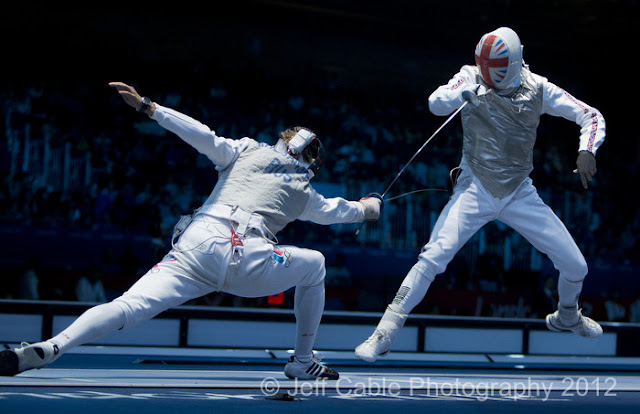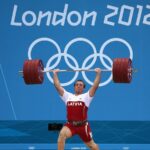Introduction to Fencing and the Olympics
Welcome to the electrifying world of fencing, where grace meets speed and strategy merges with skill. Every four years, the Olympic Games unleash a wave of excitement among sports enthusiasts worldwide, showcasing extraordinary talents from various disciplines. And within this realm of athletic prowess stands the captivating and centuries-old sport of fencing.
As we delve into the journey of gold medalists in fencing from the 2012 Summer Olympics, we will unlock tales of grit, determination, and unparalleled athleticism. These champions have fought their way through intense training regimens, mental battles against self-doubt and nerve-wracking moments on the piste (the term for a fencer’s playing area). Their stories serve as an inspiration to aspiring athletes across generations – fueling dreams that anything is possible with unwavering dedication.
So grab your sword (metaphorically speaking) and join us on this thrilling expedition as we explore what it takes to become an Olympic champion in one of history’s most elegant yet fiercely competitive sports!
| Fencing
at the Games of the XXX Olympiad
|
|
|---|---|
| Venue | ExCeL Exhibition Centre |
| Dates | 28 July – 5 August 2012 |
| Competitors | 204 from 44 nations |
| Fencing at the 2012 Summer Olympics |
||
|---|---|---|
| Épée | men | women |
| Team épée | women | |
| Foil | men | women |
| Team foil | men | women |
| Sabre | men | women |
| Team sabre | men | |
The Journey of Olympic Gold Medalists in Fencing
Achieving the status of an Olympic gold medalist in fencing is no easy feat. It requires years of dedication, sacrifice, and a relentless pursuit of excellence. The journey starts with a passion for the sport and a dream to represent one’s country on the grandest stage.
For these elite athletes, fencing becomes not just a hobby or pastime but a way of life. From an early age, they immerse themselves in training and competitions, honing their skills and developing their technique. They learn to adapt to different styles and strategies while studying opponents’ moves meticulously.
As they progress through regional and national tournaments, these aspiring champions face numerous obstacles along the way. Injuries can derail their training plans, requiring them to be resilient both physically and mentally. They must also navigate financial challenges as funding for equipment, coaching fees, and travel expenses can be limited.
To reach the pinnacle of success at the Olympics requires unwavering determination. Athletes spend countless hours refining their footwork, perfecting their attacks and defenses while balancing other aspects of life such as education or work commitments.
The mental game is equally important as physical prowess in fencing. Gold medalists possess exceptional focus under pressure; they know how to channel nerves into energy that fuels their performance rather than hindering it. Mental resilience helps them overcome setbacks during matches or recover from defeats without losing sight of their ultimate goal.
Behind every victorious fencer stands a strong support system—coaches who guide them through tough times; teammates who push them beyond limits; families who provide unwavering love; sponsors who believe in their potential.
And even after winning gold at the Olympics, this journey doesn’t end there for these remarkable athletes—they continue striving for greatness by sharing knowledge with younger generations through coaching programs or becoming ambassadors for promoting sportsmanship values worldwide.
In conclusion: The journey undertaken by Olympic gold medalists in fencing is one of perseverance, sacrifice, and unwavering dedication.
Training and Preparation for the 2012 Summer Olympics
Training and preparation are crucial elements in the journey of Olympic gold medalists in fencing. These athletes dedicate years of their lives to honing their skills, pushing their limits, and perfecting their techniques. The road to success is paved with countless hours of hard work, determination, and sacrifice.
In the months leading up to the 2012 Summer Olympics, fencers undergo intensive training regimens designed to enhance their physical strength, speed, agility, and endurance. They engage in rigorous workouts that include weightlifting sessions, cardio exercises, footwork drills, and sparring practice. Each training session is meticulously planned and executed under the guidance of experienced coaches who understand the specific demands of competitive fencing.
Aside from physical conditioning, mental preparation also plays a vital role in an athlete’s performance on the Olympic stage. Fencers must develop mental fortitude to overcome challenges such as fatigue during long bouts or unexpected setbacks during matches. Techniques such as visualization exercises and meditation help them maintain focus and stay calm under pressure.
To gain a competitive edge over opponents from around the world, fencers often seek out specialized coaching and training camps where they can refine their technique alongside other elite athletes. This exposure allows them to learn new strategies while sharpening existing skills through intense sparring sessions with top-ranked competitors.
As part of their preparations for the Olympics, fencers also participate in national tournaments or international competitions to gauge themselves against formidable opponents. These events provide valuable experience that helps them fine-tune their tactics before facing off against some of the best fencers on a global scale.
Behind every successful Olympian lies a strong support system comprising family members, coaches, teammates, and friends. This network provides emotional encouragement, financial backing, logistical support, and invaluable advice throughout an athlete’s journey. Their unwavering belief in these fencers’ abilities fuels motivation and gives them confidence when it matters most – on competition day. From arranging travel arrangements to managing training schedules, this support system ensures that athletes can focus solely on
The Mental Game: Overcoming Challenges and Nerves
The Mental Game: Overcoming Challenges and Nerves
Competing at the Olympic level requires much more than just physical strength and agility. It also demands a strong mental game, especially when it comes to fencing. Fencers must learn to overcome challenges and control their nerves in order to perform at their best on the biggest stage.
One of the key elements of mastering the mental game is developing resilience. Fencers face numerous obstacles throughout their journey, from injuries to tough opponents, but they must find ways to bounce back and keep pushing forward. They understand that setbacks are merely opportunities for growth and improvement.
Visualization plays a crucial role in preparing for competition. Olympic gold medalists often use this technique to mentally rehearse their moves, strategies, and perfect executions before stepping onto the strip. By visualizing success repeatedly, fencers build confidence in themselves and prime their minds for peak performance.
Another aspect of overcoming challenges is learning how to manage pressure effectively. The Olympics can be an incredibly intense environment with high expectations from both oneself and others. Successful fencers have honed techniques such as deep breathing exercises or focusing on positive self-talk to stay calm under pressure.
Furthermore, embracing failure is vital in the mental game of fencing. Every loss or mistake provides valuable lessons that help athletes become stronger competitors over time. Instead of dwelling on past failures, champions view them as stepping stones towards success by identifying areas needing improvement.
Maintaining focus during matches can make all the difference between victory and defeat for fencers at this level. Distractions abound – loud crowds, opponent’s mind games – yet top players are able to shut out external factors completely while remaining fully engaged in each point.
Mastering the mental aspects of fencing takes years of practice alongside physical training exertions; thus making it an essential component leading towards winning gold medals at events like The Summer Olympics!
Behind the Scenes: The Support System of Olympic Fencers
The journey to becoming an Olympic gold medalist is not a solitary one. It takes a village, or in this case, a team of dedicated individuals who work tirelessly behind the scenes to support and uplift our fencing champions.
First and foremost, we have the coaches. These mentors play a crucial role in shaping the skills and technique of our fencers. They provide guidance, push their athletes to their limits, and inspire them to reach new heights. Without their expertise and unwavering dedication, our gold medalists would not be able to achieve such incredible success.
But it doesn’t stop there. Behind every successful fencer is a strong support system that includes family members, friends, trainers, physiotherapists, nutritionists – you name it! These unsung heroes ensure that our athletes are physically and mentally prepared for competition.
Family members offer unconditional love and encouragement during both triumphs and defeats. Friends serve as pillars of emotional support when doubts creep in. Trainers focus on physical conditioning to enhance performance on the strip while physiotherapists help prevent injuries or aid in recovery if they occur.
Nutritionists play an integral role by carefully planning meals that fuel our fencers with optimal energy levels throughout training sessions and competitions. Their expertise ensures that proper nutrition boosts endurance during intense matches.
Let’s not forget about sponsors either! Companies who believe in these talented athletes often provide financial backing which allows them access to world-class training facilities as well as equipment needed for competition at the highest level.
In conclusion (not really!), behind every fencing gold medalist from the 2012 Summer Olympics lies an entire network of people who have played instrumental roles throughout their journey – from coaches shaping skills to loved ones providing constant support; from trainers fine-tuning fitness regimes to professionals ensuring peak nutrition; from sponsors enabling access to top-tier resources all working together harmoniously like a symphony orchestra. It truly takes an entire village to raise a champion.
Life After Winning Gold: How Olympians Continue Their Legacy
Winning an Olympic gold medal in fencing is undoubtedly a pinnacle moment in any athlete’s career. It represents years of dedication, sacrifice, and unyielding determination. But what happens after the glory fades and the celebrations end? How do these incredible athletes continue to leave their mark on the world?
For many fencing gold medalists, life after winning gold is about more than just personal achievements. They become ambassadors for their sport, inspiring future generations to pick up a foil or épée and chase their own dreams. These champions use their platform to promote the values of hard work, perseverance, and sportsmanship.
Beyond their role as ambassadors, many fencing gold medalists also pursue careers outside of sport. Some go on to become coaches or mentors, passing down their knowledge and expertise to aspiring fencers. Others delve into public speaking engagements or start foundations that support youth development through sports.
In addition to leaving a legacy within the sporting community, these athletes often find ways to give back to society at large. Many engage in philanthropic endeavors or use their influence to raise awareness for social causes they are passionate about. By using their fame for good, they continue making a positive impact long after standing atop the Olympic podium.
Of course, life after winning gold isn’t always smooth sailing either. Transitioning from being an elite athlete can be challenging both mentally and emotionally. The pressure of maintaining high standards while navigating new paths can be overwhelming at times.
Yet despite these challenges, fencing gold medalists persevere with resilience born out of years spent honing both physical skills and mental fortitude on the piste. They understand that success extends far beyond one momentous event – it is built upon discipline, adaptability,and perseverance in all aspects of life.
Conclusion: Empowering Future Generations through the Journey of Fencing Champions
The journey of Olympic fencing gold medalists is a testament to the indomitable spirit and unwavering dedication required to achieve greatness. These athletes have shown us that with passion, perseverance, and relentless determination, anything is possible.
Their stories inspire not only aspiring fencers but also individuals from all walks of life. Through their triumphs and challenges, they teach us invaluable lessons about resilience, mental strength, and the importance of having a strong support system.
But beyond their individual achievements on the world stage, these champions carry with them a responsibility to empower future generations. They serve as role models for aspiring athletes who dream of one day standing on an Olympic podium themselves.
By sharing their experiences and insights, fencing gold medalists can inspire young athletes to pursue their dreams wholeheartedly. They show them that success is not achieved overnight but requires years of hard work and sacrifice.
These champions also highlight the significance of mental fortitude in overcoming obstacles. They help instill confidence in others by revealing how they conquered nerves and self-doubt during intense competitions.
Furthermore, behind every fencing gold medalist stands a dedicated team – coaches, trainers, family members – whose unwavering support contributes significantly to their success. This reminds us all that we are never alone in our journeys; there are always people cheering us on from the sidelines.
As these Olympians continue their post-gold journeys in life after winning gold medals at 2012 Summer Olympics in London (and subsequent Olympics), they become ambassadors for change within society. Many dedicate themselves to philanthropy or mentorship programs where they impart guidance based on personal experiences.
In conclusion…
The rise of champion fencers from the 2012 Summer Olympics serves as an inspiration for everyone striving for excellence in any aspect of life. Their remarkable journey highlights not only physical prowess but also mental toughness and resilience while showcasing the power of a strong support system.








